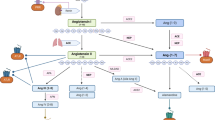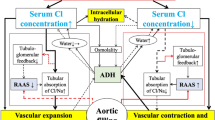Abstract
The effect of sodium in human blood pressure has been a contentious subject of considerable debate for decades. Nonetheless, it is generally conceded that there is heterogeneity to alterations in sodium and extracellular fluid volume in the blood pressure responses of normal and hypertensive humans. Although there are many forms of experimental and clinical hypertension that are clearly related to abnormalities of sodium handling and metabolism, it has been only the advent of the genetic revolution that has provided critical new insight into the mechanisms involved in many of these conditions. In this review, the clinical manifestations of salt sensitivity and several clinical syndromes associated with abnormal sodium metabolism are discussed, and factors that appear to be involved in many of the clinical abnormalities as well as relevant new insights derived from basic research are elucidated.
Similar content being viewed by others
References and Recommended Reading
Weinberger MH, Miller JZ, Luft FC, et al.: Definitions and characteristics of sodium sensitivity and blood pressure resistance. Hypertension 1986, II-127-II-134.
Weinberger MH, Fineberg NS: Sodium and volume sensitivity of blood pressure: age and pressure change over time. Hypertension 1991, 18:67–71.
Weinberger MH, Fineberg NS, Fineberg SE, Weinberger M: Salt sensitivity, pulse pressure and death in normal and hypertensive humans. Hypertension 2001, 37:429–432.
Weinberger MH: Salt sensitivity of blood pressure in humans. Hypertension 1996, 27:481–490.
Kawasaki T, Delea CS, Bartter FC, Smith H: The effects of high-sodium and low-sodium intakes on blood pressure and other related variables in human subjects with idiopathic hypertension. Am J Med 1978, 64:193–198.
Weinberger MH, Stegner JE, Fineberg NS: A comparison of two tests for the assessment of blood pressure responses to sodium. Am J Hypertens 1993, 6:179–184.
Campese VM, Romoff MS, Levitan J, et al.: Abnormal relationship between sodium intake and sympathetic nervous system activity in salt-sensitive patients with essential hypertension. Kidney Int 1982, 21:371–378.
Woods JW, Liddle GW, Michelakis AM, Brill AB: Effect of an adrenal inhibitor in hypertensive patients with suppressed renin. Arch Intern Med 1969, 123:366–370.
Grim CE, Weinberger MH: Familial, dexamethasone-suppressible normokalemic hyperaldosteronism. Pediatrics 1980, 65:597–604.
Lifton RP, Dluhy RG, Powers M, et al.: A chimeric 11 beta-hydroxylase/aldosterone synthase gene causes glucocorticoid-remediable aldosteronism and human hypertension. Nature 1992, 355:262–265.
O’Shaughnessy KM, Karet FE: Salt handling and hypertension. J Clin Invest 2004, 113:1075–1081. An outstanding and lucid review of current knowledge regarding the clinical syndromes associated with abnormalities of sodium handling. A “must-read” for anyone interested in this area.
Liddle G, Bledsoe T, Coppage W: A familial renal disorder simulating primary aldosteronism but with negligible aldosterone excretion. Trans Assoc Am Physicians 1963, 76:199–213.
Shimkets RA, Warnock DG, Bositis CM, et al.: Liddle’s syndrome: heritable human hypertension caused by mutation in the beta subunit of the epithelial sodium channel. Cell 1994, 79:407–414.
Hansson JH, Nelson-Williams C, Suzuki H, et al.: Hypertension caused by a truncated epithelial sodium channel gamma subunit: genetic heterogeneity of Liddle syndrome. Nat Genet 1995, 11:76–82.
Naray-Fejes-Toth A, Canessa C, Cleaveland ES, et al.: sgk is an aldosterone-induced kinase in the renal collecting duct. Effects of epithelial Na+ channels. J Biol Chem 1999, 274:16973–16978.
Chen SY, Bhargava A, Mastroberardino L, et al.: Epithelial sodium channel regulated by aldosterone-induced protein sgk. PNAS 1999, 96:2514–2519.
Cheek DB, Perry JW: A salt wasting syndrome in infancy. Arch Dis Child 1958, 33:252–256.
Chang SS, Grunder S, Hanukoglu A, et al.: Mutations in subunits of epithelial sodium channel cause salt wasting with hyperkalaemic acidosis, pseudohypoaldosteronism type I. Nat Genet 1996, 12:248–253.
Bartter FC, Pronove P, Gill LR Jr, et al.: Hyperplasia of the juxtaglomerular complex with hyperaldosteronism and hypokalemic alkalosis: a new syndrome. Am J Med 1962, 33:811–828.
Bettinelli A, Bianchetti MG, Girardin E, et al.: Use of calcium excretion values to distinguish two forms of primary renal tubular hypokalemic alkalosis: Bartter and Gitelman syndromes. J Pediatr 1992, 120:38–43.
Simon DB, Karet FE, Hamdan JM, et al.: Bartter’s syndrome, hypokalemic alkalosis with hypercalciuria, is caused by mutations in the Na-K-2l cotransporter NKCC2. Nat Genet 1996, 13:183–188.
Gitelman HJ, Graham JB, Welt LG: A new familial disorder characterized by hypokalemia and hypomagnesemia. Trans Assoc Amer Phys 1966, 79:221–235.
Simon DB, Nelson-Williams C, Bia MJ, et al.: Gitelman’s variant of Bartter’s syndrome, inherited hypokalemic alkalosis, is caused by mutations in the thiazide-sensitive Na-Cl cotransporter. Nat Genet 1996, 12:24–30.
Gordon RA, Geddes RA, Pawsey CG, O’Halloran MW: Hypertension and severe hyperkalemia associated with suppression of renin and aldosterone and completely reversed by dietary sodium restriction. Australas Ann Med 1970, 19:287–294.
Wilson FH, Disse-Nicodeme S, Choate KA, et al.: Human hypertension caused by mutations in WNK kinases. Science 2001, 293:1107–1112. A recent survey of the role of WNK kinases in human hypertension.
Kahle KT, Wilson FH, Leng Q, et al.: WNK4 regulates the balance between renal NaCl reabosrption and K+ secretion. Nat Genet 2003, 35:372–376.
Turner ST, Schwartz GL, Chapman AB, Boerwinkle E: WNK1 kinase polymorphism and blood pressure response to a thiazide diuretic. Hypertension 2005, 46:758–765.
Naray-Fejes-Toth A, Snyder PM, Fejes-Toth G: The kidneyspeci fic WNK1 isoform is induced by aldosterone and stimulates epithelial sodium-channel mediated Na+ transport. PNAS 2004, 101:17434–17439.
Schiffrin EL: Vascular endothelin in hypertension. Vascul Pharmacol 2005, 43:19–29.
Herrera M, Garvin JL: A high-salt diet stimulates thick ascending limb eNOS expression by raising medullary osmolality and increasing release of endothelin-1. Am J Physiol Renal Physiol 2005, 288:F58-F64.
Wang Y, Chen AF, Wang DH: ETA receptor blockade prevents renal dysfunction in salt-sensitive hypertension induced by sensory denervation. Am J Physiol Heart Circ Physiol 2005, 289:H2005-H2011.
Ohkita M, Wang Y, Nguyen ND, et al.: Extrarenal ETB plays a significant role in controlling cardiovascular responses to high dietary sodium in rats. Hypertension 2005, 45:940–946.
Lim W, Lim D, Park JB, et al.: Sodium chloride regulation of the alpha epithelial amiloride-sensitive sodium channel (alphaENaC) gene requires syntheses of new protein(s). J Steroid Biochem Mol Biol 2004, 88:305–310.
Aoi W, Niisato N, Miyazaki H, Marunaka Y: Flavonoidinduced reduction of ENaC expression in the kidney of Dahl salt-sensitive hypertensive rat. Biochem Biophys Res Commun 2004, 315:892–896.
Cao YN, Kuwasako K, Kato J, et al.: Beyond vasodilation: the antioxidant effect of adrenomedullin in Dahl salt-sensitive rat aorta. Biochem Biophys Res Commun 2005, 332:866–872.
Taylor NE, Cowley AW Jr: Effect of renal medullary H2O2 on salt-induced hypertension and renal injury. Am J Physiol Regul Integr Comp Physiol 2005, 289:R1573–1579.
Kopkan L, Majid DS: Superoxide contributes to development of salt sensitivity and hypertension induced by nitric oxide deficiency. Hypertension 2005, 46:1026–1031.
Hisaki R, Fujita H, Saito F, Kushiro T: Tempol attenuates the development of hypertensive renal injury in Dahl salt-sensitive rats. Am J Hypertens 2005, 18:707–713.
Welch WJ, Mendonca M, Blau J, et al.: Antihypertensive response to prolonged tempol in the spontaneously hypertensive rat. Kidney Int 2005, 68:179–187.
Xu H, Bian X, Watts SW, Hlavacova A: Activation of vascular BK channel by Tempol in DOCA-Salt hypertensive rats. Hypertension 2005, 46:1154–1162.
Sausbier M, Arntz C, Bucurenciu I, et al.: Elevated blood pressure linked to primary hyperaldosteronism and impaired vasodilation in BK channel-deficiency mice. Circulation 2005, 112:60–68. An intriguing animal model for primary aldosteronism that provides a new avenue for investigation of human disease.
Wang Y, Kaminski NE, Wang DH: VR1-mediated depressor effects during high-salt intake: role of anandamide. Hypertension 2005, 46:986–991.
Wang J, Roman RJ, Flack JR, et al.: Effects of high-salt diet on CYP450-4A omega-hydroxylase expression and active tone in mesenteric resistance arteries. Am J Physiol Heart Circ Physiol 2004, 288:H1557-H1565.
Author information
Authors and Affiliations
Corresponding author
Rights and permissions
About this article
Cite this article
Weinberger, M.H. Pathogenesis of salt sensitivity of blood pressure. Current Science Inc 8, 166–170 (2006). https://doi.org/10.1007/s11906-006-0014-y
Issue Date:
DOI: https://doi.org/10.1007/s11906-006-0014-y




